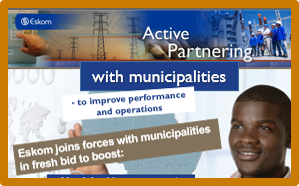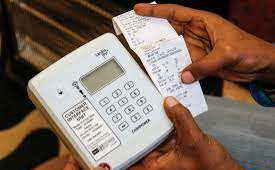
Active Partnering with municipalities to improve performance and operations
The Eskom Active Partnering Programme creates an enabling, non-threatening, mechanism to work with municipalities so as to address business and operational challenges. The programme focuses on a holistic approach, which helps the municipalities to recover financially and fulfil their constitutional mandate of delivering more reliable electricity to their customers. The resultant benefits to the municipalities are securing their revenue stream and thus being in a position to pay for their bulk electricity purchases from Eskom.
What does the programme entail?
Eskom’s role is to aid municipal partners by offering them a tailored proposal to address their own unique challenges. The partnerships are aimed at working together to improve the reliability and security of electricity supply to customers, ensure that the correct rates are charged, and to take stronger control measures to enable business recovery and sustainable growth.
Click here to view our Active Partnering factsheet
The business management section describes the key functions of business management as being the tools and resources for municipal managers to help their organisations drive business results and thrive. Here the partnership focuses on working smarter to increase profitability by improving the reliability and security of supply.
Partnering services include the following:

Maintenance and operations
- Meter management: installations, audits and replacements.
- Providing services to safely operate both low-voltage (LV) and medium-voltage (MV) networks.

Technical skills
- Accreditation and authorisation of network operators.
- Upgrading the infrastructure.
- This entails building a skills base with technical expertise.
- Network data assessment.
- Systems to effectively manage energy sales, billing and revenue management.

Demand Side Management
- Implementing of customised energy efficient products and services.

Project management
- Developing new concepts and product package designs for Municipal projects
- Executing projects on time, within budget, and finalise close-out reporting access to experienced and accredited skills.

Quality assurance
- Offer quality assurance service for Municipal projects.
- Access to experienced and accredited skills.
Work smart to increase profitability by improving reliability and security of supply!
In broad terms supply chain management means handling the flow of the product and services from generation (raw materials) to the consumption by the consumer. The focus here is on the supply and distribution processes, that require the municipality to have a network of suppliers. The goal is to deliver against the consumer demands while reducing the overhead costs and charging effective rates.
Partnering services include the following:

Asset management
- Holding strategic spares Long Lead Time (LLT Material).
- Providing life cycle management for municipal electrical infrastructure.
- Ensuring the continuity of supply.

Procure services
- Providing procurement management services.
- Developing skills for procurement management.
- Ensuring transparent, efficient and cost-effective procurement services.

Access to suppliers
- Sharing a list of suppliers.
- Subcontracting to provide a service.
- Access to accredited suppliers.
- Shared economies of scale.

Contract management
- Providing contract management service.
- Developing the municipality’s skills in contract management.
- Ensuring efficient and cost-effective contract management services.
Ensure effective rates; to keep up with demand and reduce overhead costs!
Perhaps the best way to describe network services is the “behind the scenes” part of a municipal projects. The operations managers must have good strategic planning skills because they direct the business processes and supervise the people involved in the projects to ensure that complex work is completed on time and within budget. The aim is to increase efficiency while reducing operational and capital expenditure.
Partnering services include the following:

Public lighting
- Assessing public lighting assets and conditions assessment.

GIS capabilities
- Providing GIS capability.
- Ensuring the efficient and safe operation and maintenance of the network.
- Giving a dynamic view of the infrastructure.

Energy losses management
- Removing / regularising of illegal connections.
- Investing in shielded networks which are less susceptible to tampering.
- Performing disconnections issues fines for, tampering, recovering revenue and making payment
arrangements. - Providing for Power Factor Correction and Reactive Power Compensation.

Smart metering
- Investing in a smart grid platform for more efficient, flexible
and intelligent networks.

Investment, network and master planning
- Spatial diagrams and network planning support.
Increased efficiency with reduced operational and capital expenditures!
The financial services are the economic services provided by the financial departments, which encompass a broad range of business factors such as a pricing and tariff structure, billing systems, metering, revenue collection and vendor management. Stronger financial control measures are critical to ensuring business growth.
Partnering services include the following:

Pricing and tariff structure
- Responding to and revising pricing signals to reflect current situation (cost reflective).
- Rationalising and simplifying the municipal tariffs.
- Modernising the tariff structures – evolving customers and technologies.

Billing
- Taking regular meter readings and timeously uploading the readings to ensure accuracy (at least quarterly).
- Timely billing to reflect actual / realistic. consumption.
- Timely allocating the payment and distribution.
- Proving access to billing systems.

Meter audits
- Conducting wall to wall audits of all customer meters to assess the integrity of the assets.
- Stopping the identified losses.

Revenue management and collection
- Ensuring data Accuracy: persons, account, service point and security details.
- Establishing a clear collection / disconnection policy.
- Regularly identifying the overdue accounts and taking collection reminder interventions.
- Using explicit principles and setting conditions for payment arrangements.

Vendor management
- Providing online vendor services for prepaid customers.
- Ensuring accurate view of prepaid revenue.
- Obtaining revenue directly from customers.
Contractual agreement
The Eskom Partnership Programme is designed as a contractual agreement where Eskom will assist the specific municipality based on an agreed scope of work. Every partnership is unique, to ensure mutual success, and both parties should be communicative, accessible, and flexible, with measurable results. These qualities are crucial for optimising the partnership agreements.
Frequently Asked Questions Maluti a Phofung
Active Partnering
This is to allow Eskom to provide the Municipality with a suit of engineering and revenue collection services. The Municipality still owns the distribution license and the customer base.
MFMA aims to modernise budget, accounting and financial management practices by placing local government finances on a sustainable footing in order to maximise the capacity of municipalities to deliver services to communities. It also aims to put in place a sound financial governance framework by clarifying and separating the roles and responsibilities of the council, mayor and officials.
In essence, there is no difference between a SLA, SDA and a Distribution Agency Agreement. All three agreements are for the purposes of providing service(s) as set out in the agreement.
However, S28 of the Electricity Regulation Act No 4 of 2006, allows for a Municipality to enter into a service delivery agreement with a service provider and therefore, in order to align with the Electricity Regulation Act, the agreement is called a Service Delivery Agreement.
In the MaP Judgement, the court made reference to a Distribution Agency Agreement in terms of which Eskom will be providing services on to and behalf the Municipality in accordance with S 28 of the Electricity Regulation Act.
Legal partnership
These are deductions that are in a priority order of revenues that should be deducted from revenues collected on behalf of the municipality. Once Eskom recovers the priority deductions, the remaining revenue will be paid to the municipality.
The Municipality hereby indemnifies Eskom against any loss, claim, demand, proceedings, damage and expense of whatever nature in respect of injury to or death of any person and/or loss or damage to any property of any person resulting from or caused by the performance of the Services by Eskom in terms of this Agreement unless it can be proved that the loss or damage or injury or death was as a direct result of an action or inaction by Eskom.
Eskom shall not be liable for damages, expenses or costs caused to Customers arising from any disconnection and/or partial or complete Interruption and/or partial or complete reconnection of the supply of electricity, variation of voltage, variation of frequency, any failure to supply a balanced three-phase current unless the said disconnection and / or partial or complete Interruption and/or partial or complete reconnection or failure is due to the negligence of Eskom.
Technical partnership
“Network Maintenance Services” means the services provided by Eskom to maintain the existing Municipal Networks as well as upgrade and/or strengthen the Municipal Networks, including the development of master plans and compliance reporting to NERSA.
“Revenue Collection Services” means preparation and issuing of existing and new customer applications for post-paid electricity accounts; execute credit and debt management functions for the municipal Customers; auditing and providing non-technical loss calculations as well as vending platforms for existing and new prepaid sales; reconciliation of all revenue collected from post-paid and prepaid sales and the payment of VAT;
“Support Services” means the services required to support Network Maintenance Services and Revenue Recovery Services, including but not limited to administration, human resources, information technology, safety, health, environmental and quality.
Eskom will enhance the Customer care and billing (CC&B) system that will be used to print out bills based on the municipality tariffs.
It is imperative that while Eskom is the agent that during the period training and skills are transferred to the municipal staff. This will ensure that the municipal staff are empowered to be able to continue with delivering services related to engineering and revenue collection.
Eskom will use the municipal tariffs during the active partnering agreement. Eskom will assist the municipality to apply for cost reflective tariffs during the period of agency agreement.





